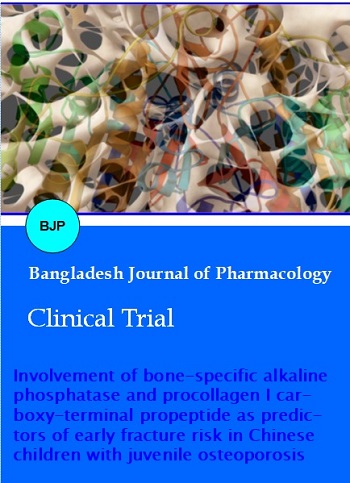Involvement of bone-specific alkaline phosphatase and procollagen I carboxy-terminal propeptide as predictors of early fracture risk in Chinese children with juvenile osteoporosis: An interventional clinical trial
DOI:
https://doi.org/10.3329/bjp.v13i2.35620Abstract
This clinical trial was designed to understand whether the children with juvenile osteoporosis receiving tablet containing vitamin D and calcium had lower incidence of bone fracture compared to the children receiving a diet rich in calcium, vitamin D, and protein. We assessed whether plasma levels of bone-specific alkaline phosphatase (BSAP) and procollagen I carboxy-terminal propeptide levels (PIPC) could be used as predictors of early bone fracture in children. A total of 120 children of either gender with a juvenile osteoporosis were enrolled and randomized (1:1 ratio) to receive tablet containing vitamin D and calcium (n=60) or diet rich in calcium, vitamin D, and protein (n=60), and undergone follow-up for up to 3 years. Blood sample was collected and BSAP and PIPC levels were measured. The results suggested that therapeutic intervention (vitamin D and calcium) does not predict bone fracture in children. However, correlations analysis revealed that the decreased level of BSAP and PIPC were associated with higher incidence of fracture. The results suggest that the low levels of BSAP and PIPC cause increase susceptibility of fracture among children with juvenile osteoporosis.
Downloads
149
131

Downloads
Published
How to Cite
Issue
Section
License
Authors who publish with this journal agree to the following terms:
- Authors retain copyright and grant the journal right of first publication with the work simultaneously licensed under a Creative Commons Attribution License that allows others to share the work with an acknowledgement of the work's authorship and initial publication in this journal.
- Authors are able to enter into separate, additional contractual arrangements for the non-exclusive distribution of the journal's published version of the work (e.g., post it to an institutional repository or publish it in a book), with an acknowledgement of its initial publication in this journal.
- Authors are permitted and encouraged to post their work online (e.g., in institutional repositories or on their website) prior to and during the submission process, as it can lead to productive exchanges, as well as earlier and greater citation of published work (See The Effect of Open Access).
